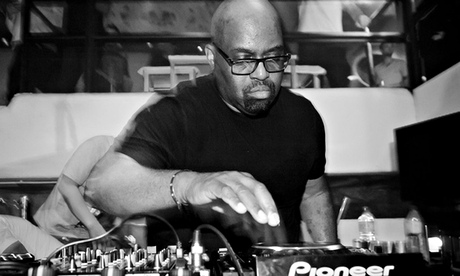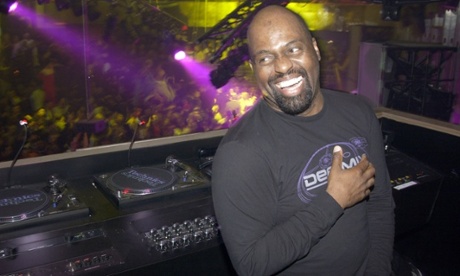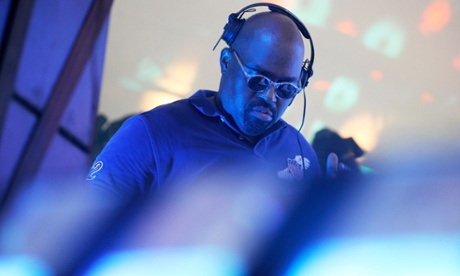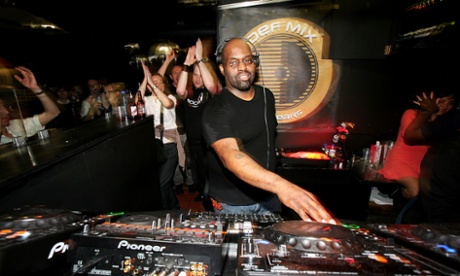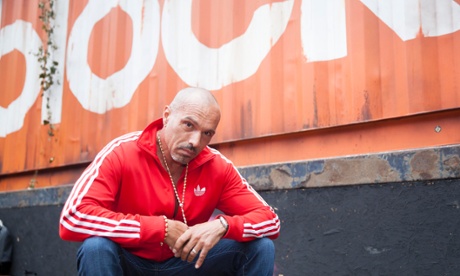Frankie’s music when it hit the club scene in Chicago was just unlike anything that had come before,” Elton John says. “That mixture of disco classics, indie-label soul and European synth disco was just fantastic. He mixed all kinds of stuff together in a way that hadn’t been done before, and I’m always excited by new ways of doing things, new ideas, so this was great to me. And here was an openly gay man packing out clubs, giving people such joy just dancing to his music. That felt very liberating.”
Acid house legend Terry Farley agrees: “I’ve been thinking about this a lot recently and there really is no other figure like him. To our generation – and for those in the younger generations who dig a bit deeper to understand the history of house music – Frankie Knuckles was our spiritual leader.”
Next Tuesday, 31 March, marks a year since the untimely passing of Knuckles, the godfather of house, at the age of 59. It’s impossible to overestimate what a pivotal figure he was in the evolution of dance music. Not only did he inadvertently give the genre its name, but for three decades he remained a leading light in the worldwide dance music community. He is to house what Little Richard and Chuck Berry are to rock’n’roll.
His story is also arguably dance music’s greatest tale. He started DJing at Better Days in Times Square when he was 16 at the start of the 1970s, before first making his name playing alongside his friend Larry Levan at New York’s Continental Baths, a subterranean club/sauna infamous for tales of legendary bacchanalian excess. When the Continental Baths closed in 1976, he moved to Chicago and a club called the Warehouse – which was to give house music its name – where he took a New York sensibility and developed a unique mix of leftfield disco re-edits, stripped-down early electronic records and oddball imports. Chicago record shops such as Imports Etc began to devote sections to what they referred to as “Warehouse music”, which was shortened to house music. One night in 1981, Knuckles was driving through the windy city’s suburbs with a friend when he saw a sign in a bar window that read: “We play house music.” “Now what’s that all about?” he asked. “It means music like you’re playing at the Warehouse,” his friend replied.
One of the many millions whose lives were shaped by Frankie’s music is Steve Hall, head of the long-running British dance label Junior Boy’s Own, who came up with the idea of releasing a tribute record to mark the anniversary of Knuckles’s death. The first thing he did was call two of the label’s cornerstone acts, Underworld and Heller & Farley. Underworld were about to enter the studio for the first time after a long hiatus, and Hall suggested they cover Baby Wants to Ride, a track synonymous with Knuckles and the Warehouse. Knuckles played the then unknown Jamie Principle’s demo of the song on reel-to-reel, before going into the studio with him to re-record the track a year later, as a sleazy, spiritual, stripped-down Chicago masterpiece.
“It was Steve Hall’s idea,” Underworld singer Karl Hyde says, “and it actually ended up being the first thing we did when we got back together, which is kind of typical Underworld. We were chomping at the bit to do something new, and then Steve dropped this curveball idea in.”
Underworld had never covered a song before, although that didn’t dawn on them until they had finished. “Yeah, we didn’t actually realise until we had finished it,” laughs Hyde. “I grew up doing cover versions in a band as a teenager, so didn’t twig we’d never done one as Underworld! But that was good really, because it meant there wasn’t any apprehension of how we should approach a cover.”
As with most of the band’s peers, and anyone of the acid-house generation, Knuckles was a pivotal inspiration. “Yes, absolutely,” says Hyde. “In the early days of Underworld, Darren Emerson used to bring in Knuckles tracks when we were writing, for reference, or if him and Rick were making a mix, there would always be Frankie tracks in the pile of 12ins they were using.”
Knuckles’ patronage was key to Heller & Farley’s early releases 25 years ago, so they were equally keen to get involved. “He was a very important figure to Junior Boy’s Own when we first started,” Farley says. “Andrew Weatherall, myself … we weren’t even DJs, we were just kids with big record collections. It was only when the records we were making – whether that was X-Press 2 or Ashley Beedle and Black Science Orchestra, or the Heller & Farley stuff – were picked up and played in New York, mainly by Frankie, that things really changed for us. We never even sent him our records – I wouldn’t have dreamed that Frankie Knuckles would ever have played one of my records! – but he picked it up on import and started playing it, and all of a sudden all these big American DJs were asking for our records.”
What they ended up with was an interpretation of Baby Wants to Ride rather than a straight cover version. “It’s not sleazy in the Chicago way, like Jamie’s vocal,” Farley says. “It’s very British, but I prefer that. The original is one of the best records of all time, in the house world, so I don’t think anyone would want to hear you attempt to copy it. We were always about making a British interpretation of an American art form anyway. We try to make records as good as theirs, and fall short, but in a way that slight failure ends up being something unique in itself.”
Once the track was finished, the stakes were raised when Underworld’s manager got hold of Elton John, known to be a fan of Underworld and Knuckles. To everyone’s surprise, Elton threw his weight behind the release.
There were jokes about John possibly playing piano on the track. ““I can imagine Elton losing his temper with me and Pete in the studio,” Farley says.
He did, however, agree to support the record and help release it. “Knowing that the Elton John Aids Foundation had established the official Frankie Knuckles Fund in collaboration with Frankie’s estate and Defmix,” John says, “they offered to gift all royalties from the single to the foundation, which was great. Everyone who worked on the track did so for free, which just shows the respect people had for Frankie.”
As for why Knuckles’ legacy extends way beyond the dancefloor, John sees a wider picture. “Kindness, generosity and being true to yourself [as Frankie was], are the qualities that we need in abundance if we are going to end the Aids epidemic. This disease is still fuelled by stigma and people hiding in the shadows. Even today the greatest symptom of HIV is shame. Frankie’s legacy as an openly gay black man is that it’s OK to be who you are. The foundation will honour that legacy by using funds raised in his name to support black and gay communities, helping them to protect themselves from HIV and get access to confidential, sympathetic HIV testing and treatment if they need it.”
Farley adds: “There are certain ideals that people in the house community hold dear, and Frankie embodied them. He wasn’t just respected, he was loved, for the person he was and for what he stood for. The house community, worldwide, lost its leading light. Without a doubt.”
Baby Wants to Ride by Underworld, Heller & Farley and the Misterons is available from babywantstoride.com as a limited vinyl 12ins or a digital bundle. All proceeds go to the Frankie Kunckles Fund
This article was amended on 27 March 2015 to correct a reference to the possibility of Elton John playing on Baby Wants to Ride.
